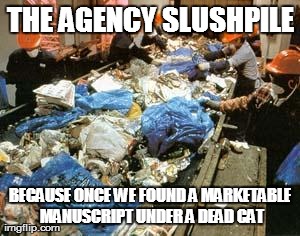Getting Unstuck: Why Gumby never had writer’s block
“Stuck” can take many forms. I’ve been stuck because I was overwhelmed with ideas and stuck because it seemed like the well was dry and I had none. I’ve become obsessed with the structural elements of a story to the point I couldn’t figure out how to get the story out, and lost days to research on minutia no reader would spend more than a few seconds glancing past. Ultimately, for me, one cure (and only one cure) seems to cure “stuck,” regardless of the cause.
On May 19, I posted a question on Query Tracker because, although I hadn’t identified my problem as me being stuck, that’s precisely what had happened. I realized that’s what had happened when one of the board’s long-time members, who happens to be my writing partner, chimed in. She ignored my question about epistolary novels and went right to the heart of the problem. Her sage, if not delicate, advice was: “just start writing the f***er and see where it takes you.”
You may think “just write” is too obvious, maybe even too trite, to be much of a solution, but it’s definitely at least part of any solution to this problem. We know that, since “just writing” is also the goal we seek – any solution is going to be measured entirely based on whether we end up “just writing” or not. But if we were always able to “just write” there wouldn’t be a problem for us to solve by “just writing.”
And we DO get stuck. Sometimes, when the problem is a simple one like me over thinking how to deal with a specific structural issue, ignoring that issue and forging forward is an option — the only option, really. When it comes to distractions, research rabbit trails, structural questions, and other things that mean we’ve basically chosen to be stuck, not making that choice – i.e., “just writing” is the key. So I narrowed my research down to cases where people were motivated and attempting to write but but still unable to do so. Instances where “just write” just didn’t work.
Excited to put off writing this post by researching it, I didn’t “just write,” and instead found a number of studies looking at the causes and implications of this phenomenon. One particularly interesting study was conducted by Mike Rose at UCLA’s Writing Research Project. His conclusion, mirrored in a number of other studies, comes down to rigidity.
For some people, the process of writing is a fluid process. They have rules and plans, but when something requires the rules to bend or plans to change, they respond flexibly. Rose found these writers did not commonly suffer from writer’s block. “Stuck,” only happens when the thing that needs to be written is different from the thing that the writer planned to write.
Your writing process is not the problem. Your prewriting process is not the problem. The problem, and the solution, rests with how rigidly you (mostly subconsciously) adhere to that process when the inevitable happens and your chosen process not the right process for writing what needs to go on the page. Some people tend to adapt their strategies without even noticing. Others see their writing rules and planning strategies as “writing,” not one particular set of rules they’ve adopted, and therefore don’t just use a different set of rules if that’s what it takes to get the job done.
Arrival at the destination drives the process for one group, and their process is a compass. If they need to go east to find a place to cross the river before resuming the trek west, the process keeps them from getting lost, but doesn’t block them from continuing on their way. For others, a specific trail on a specific map drives the process, and if a rockslide has buried the trail, they can’t go off trail long enough to keep moving toward the goal.
And all “just write” means to those people is stare harder at a map they know won’t get them where they need to go.
Flexibility needs to be added to writing for “just write” to work. Particularly for the people who are most likely to need that advice. The real solution may stem from learning what kind of subconscious rules they’ve imposed on themselves – tricky things that are hard to see. There are a million exercises to cure “writers block” all over the interwebs. Used by themselves, they may be a band-aid for one particular bout of writers block. BUT, if you approach those exercises as diagnostic tools and use them to identify the hidden, inflexible rule that caused the bout of block in the first place, you can take a huge step toward mastering even the unconscious and inflexible parts of your process.



